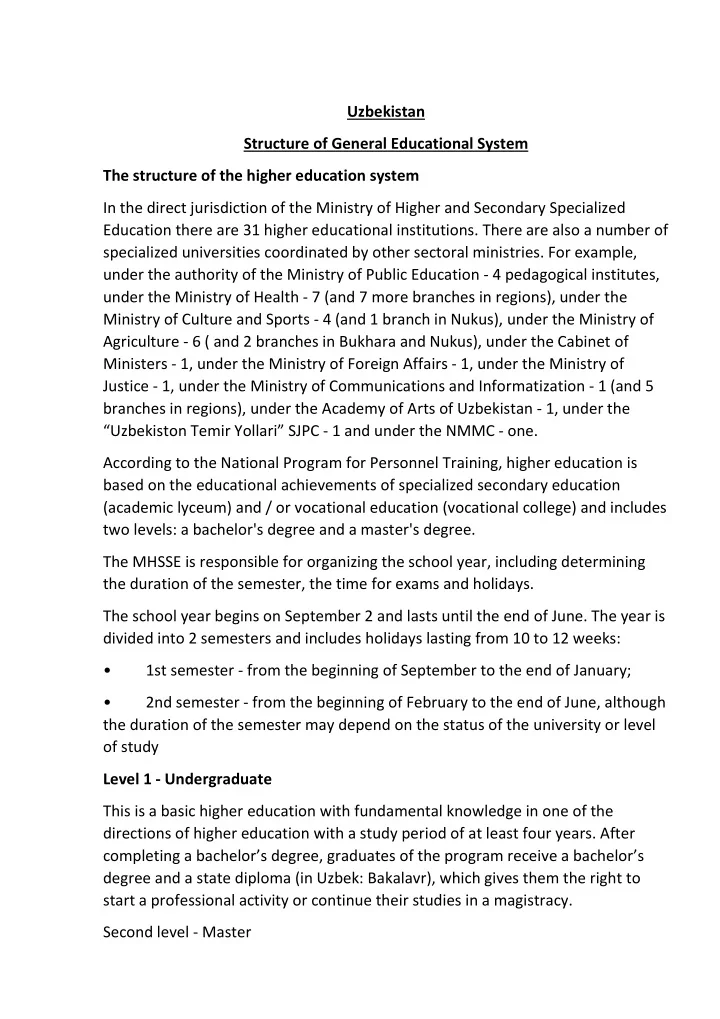

Uzbekistan Structure of General Educational System The structure of the higher education system In the direct jurisdiction of the Ministry of Higher and Secondary Specialized Education there are 31 higher educational institutions. There are also a number of specialized universities coordinated by other sectoral ministries. For example, under the authority of the Ministry of Public Education - 4 pedagogical institutes, under the Ministry of Health - 7 (and 7 more branches in regions), under the Ministry of Culture and Sports - 4 (and 1 branch in Nukus), under the Ministry of Agriculture - 6 ( and 2 branches in Bukhara and Nukus), under the Cabinet of Ministers - 1, under the Ministry of Foreign Affairs - 1, under the Ministry of Justice - 1, under the Ministry of Communications and Informatization - 1 (and 5 branches in regions), under the Academy of Arts of Uzbekistan - 1, under the “Uzbekiston Temir Yollari” SJPC - 1 and under the NMMC - one. According to the National Program for Personnel Training, higher education is based on the educational achievements of specialized secondary education (academic lyceum) and / or vocational education (vocational college) and includes two levels: a bachelor's degree and a master's degree. The MHSSE is responsible for organizing the school year, including determining the duration of the semester, the time for exams and holidays. The school year begins on September 2 and lasts until the end of June. The year is divided into 2 semesters and includes holidays lasting from 10 to 12 weeks: • 1st semester - from the beginning of September to the end of January; • 2nd semester - from the beginning of February to the end of June, although the duration of the semester may depend on the status of the university or level of study Level 1 - Undergraduate This is a basic higher education with fundamental knowledge in one of the directions of higher education with a study period of at least four years. After completing a bachelor’s degree, graduates of the program receive a bachelor’s degree and a state diploma (in Uzbek: Bakalavr), which gives them the right to start a professional activity or continue their studies in a magistracy. Second level - Master
This is a higher education in a specific specialty with a duration of at least 2 years of study on the basis of bachelor degree. Graduates of the master's degree receive a state diploma (in Uzbek language: Magistr), which gives them the right to engage in professional work or continue their education in post-graduate education institutions. Second degree The second and subsequent higher (secondary specialized, vocational) education can be received by persons with higher (specialized secondary, vocational) education. Getting a second and subsequent higher (secondary special, professional) education is carried out on a paid-contract basis. In particular, the second higher education can receive: • persons with a bachelor's degree - in the directions of the bachelor degree; • Those with a master's degree - in educational areas of undergraduate and related master specialties. The list of magistracy specialties in which you can get a second and subsequent higher education is established by the Ministry of Higher and Secondary Special Education. Higher education institutions, which have the right to offer courses of second and subsequent higher education, are determined by the State Commission of the Republic of Uzbekistan for admission to educational institutions. Currently, 45 higher education institutions offer a second higher education program, including 18 universities in Tashkent and 27 universities in the regions. Higher education institutions offering a second and subsequent higher education analyze the previous educational experience (courses taken) of students. Students take an exam in the relevant subjects to complete the level of study in accordance with the requirements of the specialty. The second higher education is provided on the basis of specialties and forms of education of a higher educational institution. At the end of the second and subsequent higher education programs, students are awarded diplomas depending on the results of certification. The performance of students enrolled in the second and subsequent higher (secondary special, vocational) education is assessed on the basis of a rating system of knowledge assessment. The third level: postgraduate education According to the Decree of the President of the Republic of Uzbekistan No. 4456 "On the further improvement of the system of training and certification of
scientific and scientific-pedagogical personnel of higher qualification" dated 24.07.2012. and Resolution of the Cabinet of Ministers of the Republic of Uzbekistan No. 365 “On measures for further improvement of the system of postgraduate education and certification of scientific and scientific-pedagogical personnel of the highest qualification” dated December 28, 2012, two-stage postgraduate education (two degrees “PhD” and “Doctor of Science”) ) was replaced by a single stage with the award of the degree "Doctor of Sciences" ("Doctor of Sciences", in Uzbek "Fanlar doktori"), starting January 1, 2013. Uzbekistan Structure of Medical Educational System According to the decree of the head of state, from the 2017/2018 school year, the terms of study in areas of medicine, vocational education (medical), military medical (medicine) and pediatric are 6 years, medical and biological case - 4 years, medical and preventive case- 5 years. Students of 2–5 courses enrolled in the indicated areas of undergraduate studies will continue their studies based on the 6-year education program. Postgraduate medical education: -training of medical personnel of higher qualification in narrow specialties in the system: graduate - 2-3 years of study; - advanced training and retraining in the field of clinical residency - 2 years of study;
Recommend
More recommend